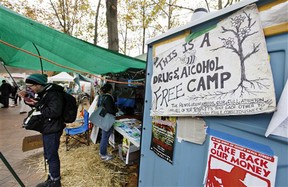 There was also opportunism here of another, more negative sort.
There was also opportunism here of another, more negative sort.
Those desperate to discredit the Occupy Movement found a propaganda goldmine in the presence of anti-social and/or intoxicated homeless.
The Occupiers had done a great job of utilizing the symbolism of homelessness (sleeping on the street, telling their stories on cardboard signs), in order to spread their message. On-lookers didn't need to hear a speech or read a book to grasp that rampant Capitalism and big business government were ruining us all.
But indiscriminate inclusivity was diverting energy and action away from the movement and into, as one person from Occupy London put it, 'babysitting people, when we should be working on ideas and outreach.' Some of the more intimidated campaigners started to drift away. They were afraid for their personal safety.
It also became difficult to attract passers-by into the camp to hear the message of the movement, when they could see loutish behavior going on within. Yet their presence may not have been accidental.
Christopher Herring and Zoltán Gluck, writing in Occupy! Scenes from Occupied America, witnessed one telling scene in Liberty Plaza (Zuccotti Park). A homeless man named Harris caused some dismay with his tale.
He reported being awoken by police officers, while sleeping on his regular park bench. They had directed him to join the protesters of Occupy Wall Street, using the carrot of free food and the stick of being moved on, if he attempted to bed down anywhere else.
This was, he confirmed, a situation which was being repeated all over New York City. It was not viewed by either Harris or the Occupiers, as an altruistic gesture by the authorities. It was a blatant attempt to ensure that potentially disruptive elements would be introduced into the camps, above and beyond the insertion of paid agitators.
For the right-wing press, this amounted to a win-win situation. While such disruptive elements were there, then papers like the Daily Mail could run headlines like Desecration, defecation and class A drugs: Children found living in squalor at St Paul's protest camp. Mainstream media could focus in on the slurred, inarticulate and free-loading, then portray them as representative of Occupy as a whole. It played nicely into the stereotypes already pushed onto the middle-of-the-road viewers back home.
If the protesters, mindful of this and fearful of personal safety, were to banish the rogue homeless, then they could just as easily be labelled 'champagne Socialists'. They shifted easily, in the public eye, to being silly, little kids, with no real grasp on the complexities of the real world.
It was a public relations nightmare, as canny city strategists no doubt guessed it would be. But more to the point, it adds legitimacy to calls from politicians to simply close them down and shut them up.


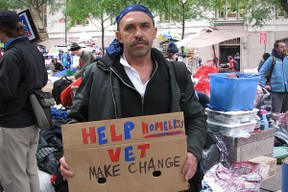 Last week, I was speaking with a member of the Occupy Movement. This is an individual who has spent a lot of time at the coalface of political activism, so knows first hand what is going on in those camps.
Last week, I was speaking with a member of the Occupy Movement. This is an individual who has spent a lot of time at the coalface of political activism, so knows first hand what is going on in those camps.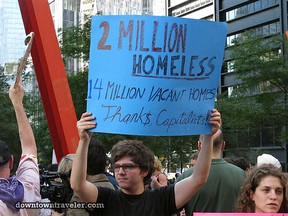 The opportunities afforded by such an out-pouring of solidarity was immediately obvious to the homeless men and women.
The opportunities afforded by such an out-pouring of solidarity was immediately obvious to the homeless men and women.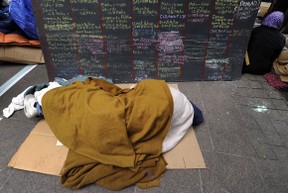






 There was also opportunism here of another, more negative sort.
There was also opportunism here of another, more negative sort.



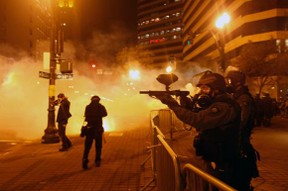 It was only ever a small percentage of miscreants amongst the homeless communities, who tried to damage the movement. Many individuals had more cause than most to simply join it, so they did.
It was only ever a small percentage of miscreants amongst the homeless communities, who tried to damage the movement. Many individuals had more cause than most to simply join it, so they did.


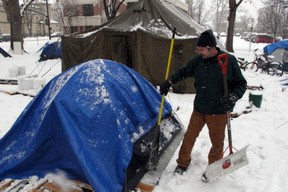 As besieged on all sides as the Occupy Movement encampments may be, they still offer some repose for the homeless joining them.
As besieged on all sides as the Occupy Movement encampments may be, they still offer some repose for the homeless joining them.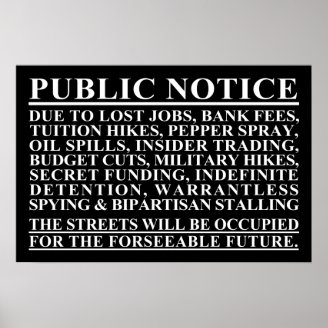


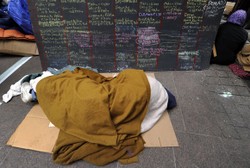

 St Tydecho's Churches in West Waleson 09/03/2014
St Tydecho's Churches in West Waleson 09/03/2014
 Goodies for an Outlander Premiere Partyon 03/06/2015
Goodies for an Outlander Premiere Partyon 03/06/2015
 Holocaust Memorial Day Interview with Rainer Höss, Grandson of Rudolf Architect of Auschwitzon 01/24/2015
Holocaust Memorial Day Interview with Rainer Höss, Grandson of Rudolf Architect of Auschwitzon 01/24/2015
 Romantic Valentine Gifts for an Outlander Fanon 01/16/2015
Romantic Valentine Gifts for an Outlander Fanon 01/16/2015

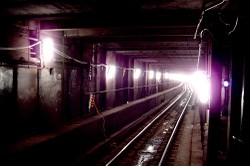

Comments
Now that is more likely! :D And yes, I bet they are. Or they should be anyway.
I think I may have used the wrong term when I said haunted. A better question might have been "are they worried about the implications of the investigation into the LIBOR scandal? :)
I have no idea how I missed that one, but thanks. I've just read it and a little smile (and the usual cynical, what PR stunt is this now?). Haunted by LIBOR implies a conscience, but hopefully yes.
Google the Independent, although other 'not so mainstream channels have the news, too. Are they haunted by LIBOR?
WOW! I had no idea about that! Thanks for the head's up! I'm so proud!
The news broke but a few short days ago, a Bank of England director admits "OWS were right." All that noise and all that effort, were not without accomplishment. :)
I sort of knew, because I'd heard bits and pieces as I followed the Livestream or talked with people. But I hadn't consciously registered it until it was pointed out to me.
They were big marches! Go you!
I loved this!
I was caught up in the politics and economics of it all. Many of the protests that were nearest to me and that I attended were marches that lasted a day or two, so it wasn't around for me to see. I hadn't even realized this was a part of it!